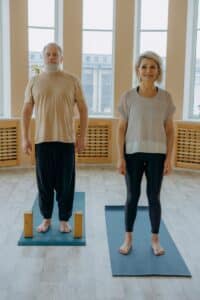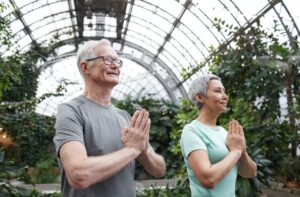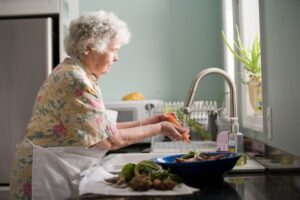Nutrition For The Elderly

Introduction
Nutrition for older people is essential, and it can be very beneficial. Seniors must get all the nutrients their body needs, especially if they lack an appetite due to medication or other health issues. Vitamins, minerals, and, most importantly, calcium are essential in maintaining healthy bones and muscle mass. Eating a balanced diet rich in fruits, vegetables, whole grains, lean proteins, and low-fat dairy products can help seniors meet their nutritional needs. Moderation with alcohol is mandatory, and avoiding processed snacks is also recommended. As seniors age, their bodies go through many changes that can affect their dietary needs. Nutritional requirements may vary from person to person based on age and activity level. However, there are some common areas of need for most elderly individuals: adequate calories, protein, vitamins, minerals, fluids, and fiber. Eating a balanced diet is crucial for seniors’ health, as it can help them maintain independence and strength.
Eating A Well Balanced Diet
Nutritious meals are essential for seniors to maintain their health and well-being. Eating healthy foods and drinking plenty of water helps provide vital nutrients, vitamins, and minerals that keep the body functioning correctly.
A balanced diet with plenty of fresh fruits, vegetables, whole grains, protein sources, and healthy fats can help ensure seniors get the essential nutrients. Additionally, it is important to limit processed foods high in sugar and sodium and stay mindful of portion sizes and eating habits because it can be easy to overeat or even forget to eat.
Nutrition For The Elderly: A Healthy Balanced Diet
The nutrition label is about the information needed to make informed decisions regarding eating a balanced diet of healthy foods, so your body gets all the necessary nutrients. Nutrients are substances in foods that help our bodies function and grow. They include carbohydrates, fats, proteins, vitamins, minerals, and water.
Generally speaking, seniors must maintain a healthy diet balanced in carbohydrates, proteins, fats, vitamins, and minerals. It is also essential for seniors to ensure their diet is fiber-rich, which aids digestion and helps prevent constipation.
Nutrition For The Elderly: Supplemental Multivitamins
Taking a multivitamin supplement can be helpful to replace the vitamins you don’t get from your diet. Vitamin D should be one of those vitamins you supplement since it helps absorb calcium, strengthening your bones and teeth.
Omega-3 fatty acids are another essential nutrient for seniors, providing anti-inflammatory benefits and aiding in healthy hormone production.

Types Of Fish High In Omega – Three’s
Eating various types of fish, mainly those high in omega-3s such as salmon, sardines, and mackerel, are great additions to your diet. Furthermore, taking an omega- three’s supplement can also be beneficial.
Additionally, probiotics may help support digestive health for our aging population. Eating various fruits and vegetables can enhance the immune system, assisting seniors in fighting off colds and the flu.
Always Taking Steps To Maintain A Healthy Lifestyle
Maintaining a healthy lifestyle is essential for older adults as they age. As well as ensuring they have access to quality resources and support. By following these guidelines, seniors can stay healthy and maintain high energy levels.
In addition to these dietary recommendations, staying educated on the latest healthcare information and treatments is essential. Open communication with healthcare providers can help seniors get the best possible care.
Assisted Living
For those living in assisted living or nursing home facilities, it’s essential to ensure they receive meals that cater to their dietary needs. The facility should provide balanced meals with fresh fruits, vegetables, lean proteins, whole grains, and low-fat dairy products.

Nursing home facilities should also offer nutritional snacks throughout the day; accommodations should ensure seniors receive the nutrients for special diets such as gluten-free or vegetarian.
Daily Exercise Has Countless Benefits For Seniors
Daily exercise has countless benefits for seniors when it comes to enjoying physical activities. Exercise can reduce the risk of chronic diseases and help seniors maintain their independence. Additionally, regular physical activity can promote better sleep, balance, and coordination, essential for daily life.
Social Interaction and regular exercise can also provide opportunities for peer interaction. This can help keep seniors socially connected and engaged in meaningful activities. Furthermore, many online resources and programs can help seniors stay associated with their peers.
Exercise For The Elderly
Exercise is essential for longevity in seniors. According to the National Institutes of Health, physical activity can prevent or delay some diseases and disabilities. Reducing symptoms of anxiety and depression while helping maintain strong bones and muscles.
As well as improving balance and coordination while promoting better sleep. Several factors significantly impact healthy eating and food for older people. One of them is

Exercise Helps Prevent Physical Decline
Exercise is vital for seniors to help prevent physical decline and maintain muscle strength. Light outdoor walks, stretching, or swimming can help increase energy levels and reduce the risk of falls or other injuries.
Outdoor Walks
Outdoor walks create so many favorable variables vital for physical health in addition to the benefits for mental health. Strolling outside is an easy way to get active and enjoy nature’s beauty. Enjoying sunshine can also improve mood, energy levels, and alertness. Plus, walking with a friend or loved one can be fun too!
Exercise Recommendations For The Elderly
Exercise recommendations for seniors vary depending on their specific situation and health conditions. Still, as a general guideline, activities like walking, strength training, stretching, balance exercises, and aerobic activity are all beneficial.
During their later years, seniors’ bodies will lose bone and muscle mass, gaining fat because their hormones aren’t very active anymore. Some great senior activities include Yoga, tai chi, swimming, walking, cycling, or light strength training.
Strength Training For The Elderly
Strength training helps balance and coordination, which is especially important as we age. It’s recommended that seniors combine strength training and cardio activities for the best results.
Strength training also helps to improve bone density and reduce the risk of osteoporosis. Try doing simple exercises like lifting weights, squats, push-ups, or sit-ups twice weekly.
Stretching And Flexibility
Stretching is another important activity that can help keep seniors agile and active. Flexibility is critical to protecting your joints and reducing the risk of falls.
Try daily stretches like neck rolls, wrist circles, shoulder shrug, and hip flexors. These simple tips can help seniors enjoy more productive, healthy, and active lives. Physical activity must be included in the day-to-day routines of seniors.
Water For The Elderly
Water in the body decreases with age, so many older folks will quickly become dehydrated. Sometimes they won’t feel thirsty, while other times, it’s too much work to pour a glass of water.
With this in mind, it’s recommended that they drink at least one ounce of water for every 2.2 pounds of weight. For example, if they weigh 140 pounds, they need at least 63 ounces of water daily. Additionally, seniors should stay well-hydrated and consume plenty of fluids throughout the day.
Staying Hydrated
Staying hydrated is one of the essential pieces of advice regarding seniors’ health. Drinking plenty of fluids helps maintain body temperature, aids digestion, and prevents dehydration. It is also necessary to be mindful of the amount of caffeine and sugary drinks consumed, as these can lead to fatigue or other health risks.
Mental Stimulation
Older adults can stay mentally active by stimulating their minds by solving puzzles, reading, writing, or playing games. Mental stimulation can help keep a person mentally sharp and healthy in their later years.
Staying mentally active by learning new skills or hobbies is a great way to stay engaged and keep the mind sharp.
Brain-Stimulating Activities
Cognitive decline is an unavoidable part of aging, but some methods can be used to slow it down. Brain-stimulating activities such as crossword puzzles and memory games can help boost cognitive functions.
Reading
Books offer an escape from the world and a great way to engage the mind. Stick to topics that are interesting and challenging for optimal mental stimulation. Not only will this help with maintaining cognitive function, but it can also help improve memory and reduce stress.
Meditation
It may sound intimidating, but meditation can significantly reduce stress levels, promote relaxation and improve mental health. Take time each day to sit quietly, close your eyes, and focus on your breath. Try to stay in this relaxed state for 10-15 minutes. Activities like these can help to keep seniors feeling active, healthy, and active well into their golden years.

Socializing For The Elderly
Maintaining social contact is crucial for seniors’ health. Regularly talking with friends and family can help keep seniors connected and engaged, promoting positive mental health. Consider joining a club or organization if your schedule allows for it.
Even if that’s impossible, having meaningful conversations with people in your life can be just as beneficial. Staying connected with family and friends is vital to maintaining good mental health.
This can be done in person or through virtual means such as video chat or text messaging. Staying connected with people ensures that social ties are being confirmed and done regularly, such as game nights or coffee with friends.
Staying Socially Active
Being socially active is critical to maintaining mental well-being. Participating in book clubs, art classes, or socializing with friends.
Staying connected with others helps to reduce feelings of loneliness and can help seniors feel connected to their community. Additionally, many senior centers have fitness and computer classes, which are great ways to stay physically and mentally active.
Lastly, seniors must keep their minds active. Staying mentally active is just as important as staying physically active!
Getting Social In The Community
Seniors must also stay socially active since having friends and family can help reduce stress, increase their quality of life, and boost overall well-being.
This can include attending events with other seniors in the community, joining clubs or classes, participating in group activities like walking or swimming, attending church services, or even volunteering.
Keeping Busy And Staying Active

Retirement brings a lot of free time, which can cause boredom and depression. That’s why it is so important to keep busy and engaged to prevent this from happening.
Stay Engaged And Active During Retirement
Staying engaged can include taking up a new hobby, such as art or woodworking, volunteering in the community, going on day trips with friends and family, and even picking up an old hobby that had been neglected. There are plenty of ways to stay engaged and active during retirement, so find a few that work for you and your lifestyle.
Regular Checkups Are Very Important
It is so important that seniors take proper care of themselves. This includes nutrition, adequate hydration, regular exercise, sleep and rest, supplements to fill in nutritional gaps, and regular checkups.
It is also essential to stay up-to-date with regular checkups so any deficiency can be identified early and treated as quickly as possible. This will lead to improved health and a better quality of life.
Regular checkups can help detect early warning signs of health problems or diseases. It is also essential to watch for changes in behavior, such as memory loss or confusion.

Vitamins and Minerals
The body needs specific vitamins and minerals to stay healthy, and seniors may require additional nutrients for proper functioning. Calcium is essential for bone health; vitamin D helps the body absorb calcium. Iron aids in red-blood-cell production, while magnesium helps maintain nerve
Vitamin B12
Vitamin B12 helps form red blood cells and plays a role in the functioning of your nervous system. It can be found in animal products like eggs, poultry, beef, and fish. If you are vegan or vegetarian, you may need to supplement with vitamin B12 as it is not found in plant foods.
The recommended daily vitamin B12 for adults is 2.4 mcg (micrograms).To absorb the benefits of B12, the stomach must produce the intrinsic factor. Most older adults suffer from a deficiency in B12 because they have a condition known as atrophic gastritis, in which your stomach lining has thinned.
Pernicious Anemia
Pernicious anemia makes it hard for your body to absorb vitamin B12. This condition causes stomach inflammation, bacterial overgrowth, and the intrinsic factor. Without the intrinsic factor, this vitamin can be absorbed. Supplementation is the best way to ensure proper absorption of B12.
Vitamin E
Vitamin E is essential in protecting your cells from damage caused by free radicals. This fat-soluble vitamin helps protect cells from damage caused by free radicals and helps support a healthy immune system. It also promotes healthy skin, hair, and eyes.
While you can get vitamin E from foods like almonds, spinach, and sunflower seeds, it may be challenging to obtain the recommended daily amount through diet alone.
Supplementation is a great way to ensure you get enough of this vital vitamin. The recommended daily dose of vitamin E for adults is 15 mg (milligrams)V. vitamin E is a fat-soluble vitamin in many foods, including nuts, seeds, and vegetable oils.
Vitamin E Is A Antioxidant
It’s an antioxidant that helps protect the body from free radicals, which can damage cells. Vitamin E is also essential for healthy skin and eyes. The recommended daily dose of vitamin E for adults is 15 mg (milligrams).
Vitamin K
Vitamin K helps your blood clot properly and plays a role in bone health. This vitamin can be found in kale, spinach, and broccoli. However, supplementation may be necessary for some individuals. The daily recommended dose of vitamin K for adults is 90 mcg (micrograms).

Vitamin D
Vitamin D helps your body absorb calcium and phosphorous, essential for strong bones and teeth. It also helps regulate your immune system and may even reduce the risk of certain types of cancer. Vitamin D can be found in foods like eggs, salmon, and fortified milk.
While you can get vitamin D from foods like fish, eggs, fortified milk, and cereal, supplementing is the best way to ensure you get enough of this vital vitamin.
Supplementation may be necessary if you are not getting enough of this vital vitamin from your diet. The recommended daily dose of vitamin D for adults is 600 IU (international units).
Your doctor can review your diet and advice if supplements or adjustments need to be made to ensure you get the vitamins and minerals your body needs. They can advise on the right foods to eat, appropriate dosages of supplements, and how often they need to be taken.
Folate
Folate is a B vitamin in leafy green vegetables, citrus fruits, and legumes. It helps make DNA and RNA, the genetic material in cells, and it also plays a role in red blood cells. Folate, or vitamin B9, plays a vital role in red blood cell production and the metabolism of amino acids and proteins.
People prone to folate deficiency (especially pregnant women) should take a supplement to ensure they get enough. The recommended daily dose of folate for adults is 400 micrograms and 600 to 800 micrograms for pregnant women.
Iron
Iron is crucial in many foods, including red meat and seafood. It helps deliver oxygen throughout the body for healthy growth and development. The recommended daily dose of iron for adults is 8 mg (milligrams) per day.
Magnesium
Magnesium is a mineral found in nuts, legumes, and green vegetables. It helps the body to make energy, build strong bones, regulate blood sugar levels, and maintain nerve and muscle function. The recommended daily dose of magnesium for adults is 400 mg (milligrams).
For older people, iron deficiency can become a problem for those who aren’t eating proper foods with high magnesium levels. Good sources of iron include lean red meats or breakfast cereal.
Zinc
Zinc is an essential trace mineral with many health benefits—helping our immune system function properly. As well as fending off the likelihood of infectious diseases and making Zinc a valuable part of a senior’s diet. Zinc intake is not regular among older people; to make matters worse, it’s not absorbed very well. Meat, poultry, and fish should be a part of your diet to help you meet the requirements for Zinc.
Calcium
Calcium is an essential mineral that helps to build strong bones and teeth. It’s found in dairy products, leafy green vegetables, and fortified foods like orange juice and cereal. Calcium is one ingredient that most elderly folks simply aren’t getting enough of. Most believe that calcium upsets their stomach so they will avoid it.
Seniors should be getting around 1,500 mg of calcium a day, and nonfat powdered milk can be used in recipes as a substitute for milk. The recommended daily dose of calcium for adults is 1000 mg (milligrams). Food such as yogurt, low-fat cheese, and broccoli can also help you meet the requirements for calcium.
Vitamin C
The body needs vitamin C to synthesize collagen for healthy skin, bones, and muscles. Vitamin C also helps protect cells from oxidative damage and supports immune function.
Without sufficient amounts of this vitamin, people can develop scurvy, which causes bruising and bleeding due to weakened capillaries. Vitamin C can be found in fruits and vegetables like oranges, strawberries, kale, and brussel sprouts.
Carbs and fiber
Carbohydrates are the primary source of energy for the entire body. You can find carbs in bread, cereals, pasta, and other grain products. A diet that’s high in fiber and water will help to prevent constipation as well as supply your energy needs.
Fat
Fat intake for older people should be limited but not eliminated. You can limit fat by choosing lean meats, low-fat dairy products, and food preparation methods that don’t include frying.
Protein
Protein is an essential part of the diet for seniors, as it helps to maintain muscle mass and prevents bone loss. High-quality proteins such as fish, poultry, eggs, low-fat dairy products, beans, seeds, and nuts are all good sources. At this stage in life, protein is essential.
Protein is needed to support a healthy immune system and prevent muscle wasting. Since energy needs are less, older folks should eat high-quality protein such as eggs, lean meats, poultry, and fish. Including healthy proteins in meals can help keep senior citizens feeling strong and energized.
Nutrition For The Elderly Must Include Essential Vitamins And Minerals
These are just a few essential vitamins and minerals for overall health. Elderly individuals should stay active and strive for a well-balanced diet. Each of the above nutrients helps to keep an aging body healthy.
Learning how our choices regarding the foods we eat daily can help us meet our daily nutrient needs. As a result, maintaining a healthy body weight reduces the risk of chronic disease. Even though this old body isn’t the same as it used to be, proper care and the right nutrients can help the elderly enjoy a healthy and
long life.
Conclusion
Nutrition for the elderly can be complicated, but with the proper nutritional diet and care, elderly individuals can still live long and healthy life. Eating the right foods with the necessary vitamins, minerals, and other nutrients is essential for maintaining an aging body. Additionally, all adults should strive for regular physical activity to remain physically fit as they age. Regular checkups are also crucial to monitoring overall health. With the proper support and habits, elderly individuals can still enjoy living a whole and happy life. We hope this article has helped you understand the importance of nutrition for the elderly. Thank you for taking the time to learn about how seniors can stay healthy and active! We hope this information has been helpful.
Share via:

